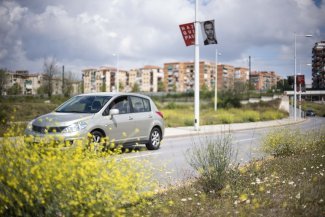Often green spaces in urban areas are unequally distributed, with parks, tree-lined streets and green roofs planned for wealthy and gentrifying districts. Those living in poor districts lack these spaces, and their introduction is not a priority for urban planners – nor necessarily a demand from the inhabitants, especially when basic infrastructure might be lacking. However there are an increasing number of scientific studies indicating how critical access to nature is for well-being, and how it can support both our mental and physical health. So how can we ensure that nature is not an afterthought in urban planning in marginalised areas?
Nature-based solutions are one answer to this conundrum with multiple benefits; they can help enhance infrastructure, boost economic activities, support food security, enhance social inclusion and address pollution. The European Union (EU) is supporting their utilisation to help cities become more sustainable. The European Commission defines them as: “Solutions that are inspired and supported by nature, which are cost-effective, simultaneously provide environmental, social and economic benefits and help build resilience. Such solutions bring more, and more diverse, nature and natural features and processes into cities, landscapes and seascapes, through locally adapted, resource-efficient and systemic interventions.”
Nature-based solutions in practice take a wide variety of shapes and forms, such as green walls, green roofs, urban farms, constructed wetlands, fish steps, sponge parks, aquaponics and much more.
The umbrella term ‘nature-based solutions’ is used, as it helps channel funding for these efforts, support cohesive research and help establish robust standards for quality. However, the term has received backlash due to its use in greenwashing, especially by the private sector, and the lack of integration and acknowledgement of Indigenous knowledge. Many nature-based solutions have been practices for millennia and are by no means new. To address this, organisations such as the International Union for Conservation of Nature and the EU are trying to develop criteria and a global standard for nature-based solutions to help avoid misuse.
Collaboration is paramount
Through its Horizon research and innovation programmethe EU is funding many projects that aim to utilise nature-based solutions to transform urban and rural areas. A core component in these projects is ‘co-creation’ with a variety of stakeholders, especially marginalised and vulnerable groups. Take for example the proGIreg project that started in 2018; the funding has been used to develop and implement eight different types of nature-based solutions in post-industrial districts in Dortmund (Germany), Turin (Italy), Zagreb (Croatia) and Ningbo (China). The project has invited additional cities to follow the process, visit the nature-based solutions sites and learn from the examples of the four cities, to help spread knowledge and skills.
In Zagreb in the post-industrial district of Sesvete, the grounds of an old meat factory were revitalised with nature-based solutions. The district has the youngest population in Zagreb which has been growing, and has a need for more communal public spaces and greenery. A therapeutic garden, small farm with aquaponics and urban farms and gardens have been introduced in the district. The therapeutic garden has been designed together with a local association supporting people with disabilities, to ensure its accessibility for all. The associations and local schools organise regular activities in the green spaces e.g. urban farming workshops and cultural events.
In Turin the project is improving the Mirafiori district that used to be a Fiat car hub. As one of many nature-based solutions introduced in the district, one entails educating and enlisting the users of mental health services to help monitor pollinator biodiversity in the urban gardens introduced in the district. In Dortmund the project has supported the creation of a citizen-based association that is introducing pollinator-friendly habitats in the city and advocating for more flowering meadows, among other activities. In Ningbo in the Moon Lake Park district, local stakeholders such as businesses, citizens and organisations were consulted to help plan which nature-based solutions would be most suitable for the area.
ProGIreg is just one of many EU-funded projects implementing nature-based solutions; GoGreenRoutes explores the relationship between mental health and green spaces, CLEVER Cities targets nature-based solutions to enhance social inclusion in degraded areas, Conexus brings together European and Latin American partners to enhance nature-based solutions for ecosystem restoration and NICE uses nature-based solutions to create urban circular water loops.
These and many more projects are establishing nature-based solutions as the building blocks for sustainable and inclusive cities. To support cohesion among all these actors, the EU introduced a support service, titled NetworkNature – which does what the name implies; it gathers the knowledge and people working in the field together, to maximise the impact of nature-based solutions. Additionally NetworkNature identifies where more effort and research are needed to ensure nature-based solutions are implemented in a holistic manner.
From concrete jungles to urban oases
If planned with care and co-created with citizens, nature-based solutions can be a revolutionary way to change our urban environments to be more sustainable and inclusive. Nature-based solutions have multiple benefits for the ecosystem and its inhabitants. They can help bolster biodiversity, for example by introducing flowering meadows in abandoned lots to create pollinator habitats and fish ladders to support their migration. Nature-based solutions can create economic stability in poor communities with the use of produce from urban farms, and lowered heating and cooling costs through insulation and shading from green walls and roofs. Nature-based solutions can also be key for inclusion and health through providing safe spaces for respite, socialisation and activities and through mitigating pollution, in areas where access to urban services might be otherwise limited.
How can cities get started with introducing more nature-based solutions? One way is to keep abreast of the Horizon Europe funding calls, and another is to join a network of sustainable cities such as ICLEI Europe, that draws in its members in such calls, projects and initiatives.












